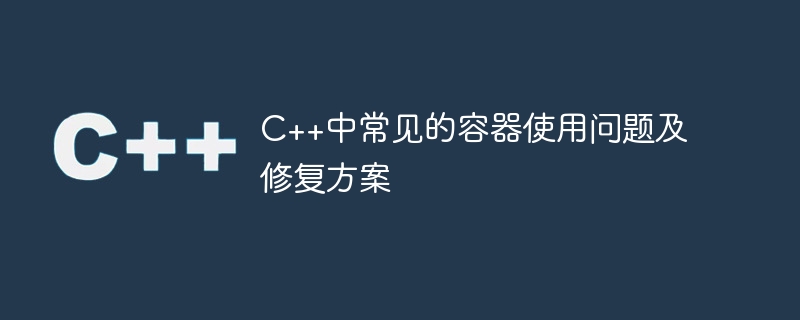

Common container usage problems and repair solutions in C
Introduction:
In C, the container is a very important data structure used for storage and management data. STL (Standard Template Library) provides many container types, such as vector, list, map, etc., which can greatly simplify the program development process. However, improper use of containers often leads to various bugs and performance issues in the program. This article will introduce some common container usage problems and provide corresponding fixes and specific code examples.
1. Memory leak problem
Memory leak means that after the program allocates memory, it does not release it correctly, causing the memory to be unable to be used by the program again. When using containers, if you do not pay attention to releasing memory correctly, memory leaks may easily occur. The following is a typical memory leak problem:
void func()
{
vector<int> vec;
vec.push_back(10);
vec.push_back(20);
//...
// 错误的释放内存
delete &vec;
}Fix: In C, the memory management of the container is automatic and there is no need to manually release the memory. You should avoid using the delete operator to release container objects. The correct fix is as follows:
void func()
{
vector<int> vec;
vec.push_back(10);
vec.push_back(20);
//...
// 不需要手动释放内存
// vec会在该函数结束时自动释放内存
}2. Iterator failure problem
Iterator is a tool in C used to traverse container elements. When using containers, pay attention to the validity of iterators, otherwise the program may crash or produce incorrect results. The following is a typical iterator invalidation problem:
void func()
{
vector<int> vec;
vec.push_back(10);
vec.push_back(20);
//...
// 错误的操作:删除容器元素后继续使用迭代器
for (vector<int>::iterator it = vec.begin(); it != vec.end(); ++it)
{
if (*it == 10)
{
vec.erase(it);
//...
}
}
}Fix: When an element is deleted from the container, the iterator will become invalid, and continuing to use the invalid iterator will cause a program error. The correct fix is to use the new iterator returned by the erase function, as shown below:
void func()
{
vector<int> vec;
vec.push_back(10);
vec.push_back(20);
//...
for (vector<int>::iterator it = vec.begin(); it != vec.end();)
{
if (*it == 10)
{
it = vec.erase(it);
//...
}
else
{
++it;
}
}
}3. The problem of out-of-bounds access to container elements
When using containers, pay attention to the boundary issues when accessing container elements , otherwise illegal memory addresses may be accessed, causing the program to crash or produce erroneous results. The following is a typical container element access out-of-bounds problem:
void func()
{
vector<int> vec;
vec.push_back(10);
vec.push_back(20);
// 错误的操作:越界访问容器元素
int value = vec[2];
//...
}Repair solution: The correct repair solution is to use the at function for element access. The at function will perform boundary checks and throw exceptions to avoid accessing illegal memory addresses. As shown below:
void func()
{
vector<int> vec;
vec.push_back(10);
vec.push_back(20);
try
{
int value = vec.at(2);
//...
}
catch (const std::out_of_range& e)
{
// 处理越界访问异常
//...
cout << "out_of_range exception: " << e.what() << endl;
}
}Conclusion:
The correct use of containers is one of the important skills in C programming. This article introduces common container usage issues and corresponding fixes, and provides specific code examples. In actual programming, attention should be paid to avoiding problems such as memory leaks, iterator failures, and out-of-bounds access to container elements to improve program stability and performance.
The above is the detailed content of Common container usage problems and repair solutions in C++. For more information, please follow other related articles on the PHP Chinese website!
 Vue parent component calls the method of child component
Vue parent component calls the method of child component
 What is digital currency trading
What is digital currency trading
 How to use fusioncharts.js
How to use fusioncharts.js
 length function usage
length function usage
 Cost-effectiveness analysis of learning python, java and c++
Cost-effectiveness analysis of learning python, java and c++
 Representation method of string constant
Representation method of string constant
 mysql transaction isolation level
mysql transaction isolation level
 How to open .dat files
How to open .dat files
 how to build a website
how to build a website




